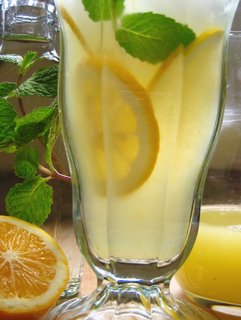Of course, Carnegie was telling his audience that, when fate hands you something unpleasant, make the best of it. When fate hands me that kind of lemon, I would more than likely stare at it for a moment and say something like, "I don't think that lemon is mine," and walk away.
When fate or, more often than not, the supermarket checker hands me an actual lemon, I am more likely to own it. When fate hands me Meyer lemons, I get happy.
I am not about to delve into the history and genetics of the Meyer lemon today. Others have done it well enough that I do not have to. I suggest you let our own Amy Sherman tell you about them. Read her blog post on Meyer lemons.
If you want a few ideas as to what you can do with Meyer lemons, read another Amy's (Scattergood) fun list "100 things to do with a Meyer lemon" from the Los Angeles Times online to get some great ideas. Some are oddly practical, like playing fetch with them in order to freshen canine breath. If you can come up with other uses, please let me know. No one has mentioned the Meyer lemon as an elbow-softener. Perhaps there are few people who still care for supple joints as I do.
And if you really, really want to know everything you could possibly want to know about the lemon, its history, and its uses, by all means go out and buy yourself a copy of Much Depends on Dinner by Margaret Visser. It's quite a fascinating read.
Look, I just like lemons. Perhaps it's my Sicilian heritage and the fact that my ancestors actually earned their bread and marmellata exporting the little yellow fruits. Which leads me to wonder that, had Dale Carnegie been born, say, Dale Carneghi, he might have said, "When fate hands you a lemon, make limoncello." But he wasn't and he didn't, so I am stuck with making lemonade for the purposes of today's post.
It strikes me as a cruel twist of fate that a fruit which makes such a great summer thirst-quencher should reach its peak in the dead of winter, but that isn't going to stop me from making it. One still needs to stave off scurvy, even in the chilly months. What better way to pretend that winter isn't happening than to wear gingham, put some zinc oxide on your nose and pour yourself a tall glass of lemonade? It is denial perfected. After all, I believe it was Mr. Carnegie who also said, "Happiness doesn't depend on any external conditions, it is governed by our mental attitude." I am not going to argue with him about that. With that as my new credo, I shall chose to pretend it isn't raining outside, my complexion isn't pasty, and I haven't gained 10 pounds. Instead, you'll find me inhabiting my inner world, where it's perpetually sunny, and I am always tan and thin. Thanks for the motivation, Dale.
Meyer Lemonade

Meyer lemons are ideal for making lemonade. Lacking confidence in their own identity (half lemon, half mandarin), they share space well with others. Three flavors that blend well (in lemonade) with the fruit are mint, cucumber, and coriander. Yes, coriander. Don't ask me how I know. I have chosen mint today because it is pretty.
Ingredients:
1 cup freshly squeezed Meyer lemon juice-- about 5 to 6 lemons, depending upon size and juiciness. You can actually squeeze them the night before-- the juice won't separate like orange juice does.
1 cup simple syrup. Mint is added to mine here. I'm not telling you how to make simple syrup.
3 to 4 cups cold, clean water.
Mint sprigs and (very) thinly sliced Meyer lemons for garnish.
Ice cubes, if you're into them. I find they keep the garnish from floating to the top.
Preparation:
1. Take all the ingredients and dump them into a big enough pitcher. Stir and serve.
Or, if you want to be very French about it and serve it comme un vrai citron pressé...
1. Place lemon juice and syrup in the antique apothecary beakers you found for next to nothing at the marché aux puces in Dijon last autumn. Place on a tray with chilled, bottled Volvic, one pastis glass and spoon per person, and a pack of Gauloises Blondes. Let your guests prepare their own concoctions, according to personal taste.
Note: If you opt for cucumber lemonade, slice up a cucumber thinly, add to the water and refrigerate for 24 hours. For coriander? I haven't quite figured that one out. I'll let you know when I do.
Serves 4 to 6.